From natural disasters to tragedy, politics, religion and immigration - we look back at RNZ's most-read news stories of 2015.
RNZ's news team explored, investigated and delved into topics across the spectrum this year - including the bizarre, sad and controversial.
Hundreds of thousands of people read our news stories online, with readership figures suggesting RNZ's audience is particularly interested in - among many other topics - politics, immigration and adverse weather events.
We've compiled a list of some of our most-read stories this year.

Auckland woman Sara Jawadi called for interest-free loan options for Muslims.
Photo: RNZ / Diego Opatowski
Kiwi Muslims want to escape rent cycle
Auckland woman Sara Jawadi's campaign for banks to give her and other Muslims an interest-free loan to purchase their first home certainly caught readers' attention. With more than 200,000 individual readers, it was RNZ's most-read news story of the year.
The story explained the potential plight of thousands of Kiwi Muslims facing a choice between their religion and economic stability, as interest is forbidden in Islam.
Ms Jawadi had contacted several banks to work out a plan, and eventually met with ANZ but was told there was no product that could be offered to people in her situation. Other banks didn't respond.
PM announces immigration rule change
Prime Minister John Key's announcement he would be changing immigration rules to attract skilled migrants and entrepreneurs to the regions was RNZ's second most-read story.
Some immigrants have to meet a certain number of points before their residency is approved. The changes boosted entrepreneurs' bonus points from 20 to 40, while for skilled immigrants it went up from 10 to 30 if they set up a business or accepted a job offer outside Auckland.
The prime minister explained the rule changes at the National Party's conference in July.
Immigration appeared to be a hot topic for RNZ readers, with a story on a Filipino migrant worker scam also among the most-read 25 stories of the year.

Kanoa Lloyd
Photo: SUPPLED
3 News defends use of Te Reo
3 News presenter Kanoa Lloyd had been on the job for five months when she took to Twitter to talk about resistance to her use of Te Reo, saying it was a weird part of her job to get weekly complaints about her use of Māori words in the weather report.
"It's been a new thing to me, people writing to me to request I don't refer to New Zealand as Aotearoa, and to be honest I was a bit surprised by it," she said at the time.
"I thought I had a bit of a thick skin but I've never really encountered people who take offence to Māori being used," she said.
RNZ's story - which was our third most-read for the year - reported how the broadcaster was supportive of keeping Te Reo alive.
Flagged flags - what could have been
Coming in at number four was an opinion piece by RNZ resident illustrator and comic artist Toby Morris.
"Well, I sure hope you like ferns," Mr Morris wrote in the wake of the announcement of the final four flag options, which he labelled "three lumpy ferns and a token koru".
His piece looked at the flag options that didn't make it, including Red Peak, which was later included as a fifth option. The flag referendum was another hot topic among readers, with a story on Red Peak possibly making the final cut, and flag fallacies also included in the 25 most-read stories of the year.

Some of the flagged flags. Red Peak (top centre) was added to the final cut.
Photo: SUPPLIED
Close watch on Cyclone Pam
New Zealand and Pacific Island nations were on alert when Cyclone Pam approached in March. New Zealand escaped the cyclone's wrath, but some areas in Vanuatu, Tuvalu and Kiribati were devastated.
Stories on cyclone alerts for New Zealand and Samoa and the announcement of a state of emergency in Tuvalu were among the top 25 most-read.
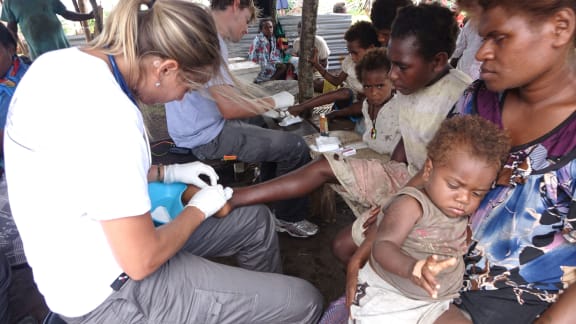

A medical team from the Superyacht Dragonfly run an emergency medical clinic at Cooks Bay Erromango. Children were getting cuts from all the debris left by the cyclone and without proper care many were getting badly infected.
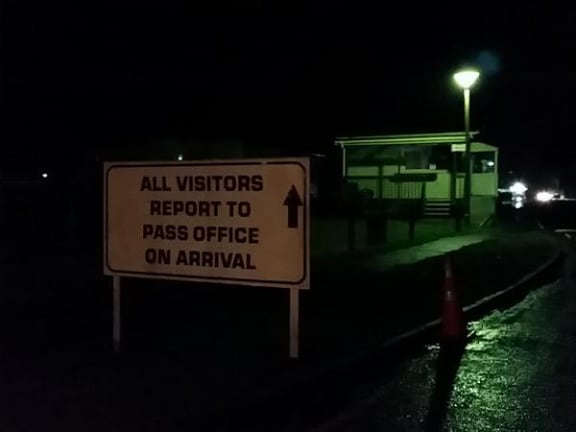

RNZI reporter Koroi Hawkins arrives at Whenuapai for possible passage on a defense force flight to Port Vila. 16 March 2015.


Squadron Leader Steve Thornley is heading up the Vanuatu missions. He says when flying over Tanna Island they saw a lot of destruction. 16 March 2015.


Relief supplies bound for Port Vila being loaded at Whenuapai air force base. 16 March 2015.


First RNZAF C130 Hercules leaves for Vanuatu at 10:30am. Flight time 5 hours. 16 March 2015.


Hanna Butler of the New Zealand Red Cross says the humanitarian needs in Vanuatu are expected to be overwhelming. 16 March 2015.


Second Hercules departing Whenuapai. RNZI reporter Koroi Hawkins will soon be reporting from Port Vila, Vanuatu. 16 March 2015.


Vila Bauerfield International Airport reopened. 16 March 2015.
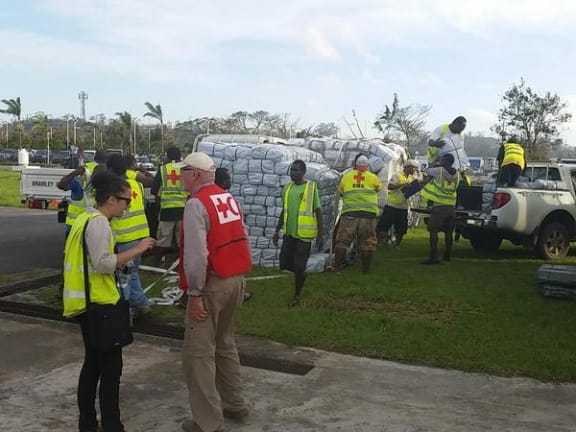

Vanuatu red cross volunteers unpack relief supplies for distribution as soon as they are off the planes. 16 March 2016.


Evidence of cyclone Pam. Vila Airport yet to receive first commercial flight. 16 March 2016.
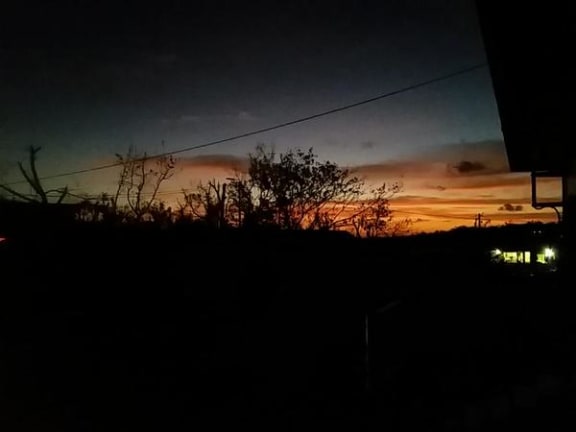

Port Vila. Power is out. Water runs only in some places. Police Curfew has started. There is so much destruction. Koroi Hawkins. 16 March 2015.
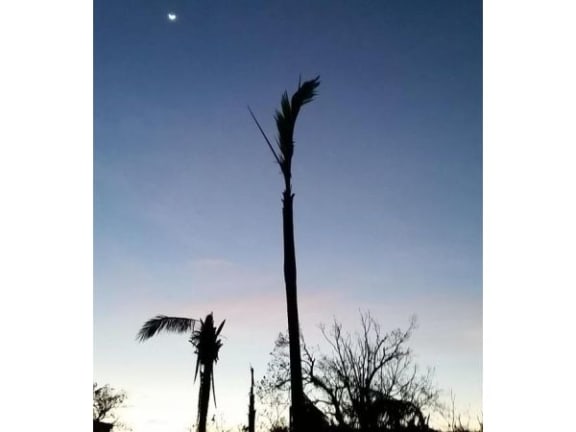

Birds chirping in leafless trees in Port Vila. 17 March 2015.
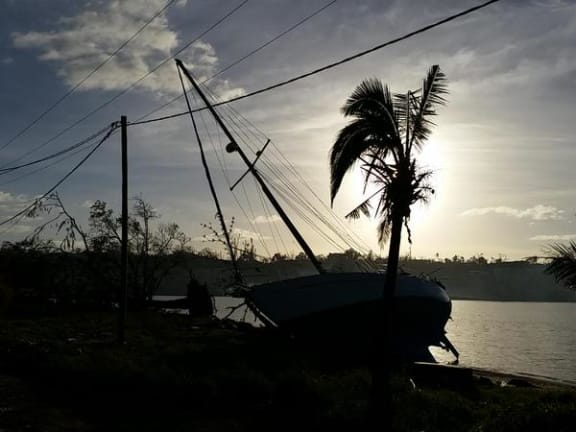

Many boats are lying along the shore in Port Vila. They are the lucky ones. Others are at the bottom of the ocean. 17 March 2015.


Command center, Vila National Disaster Management Office (NDMO). 17 March 2015.
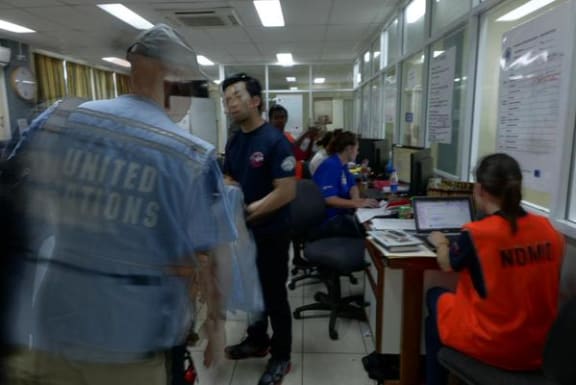

Vila National Disaster Management Office control center bustling with activity. 17 March 2015.
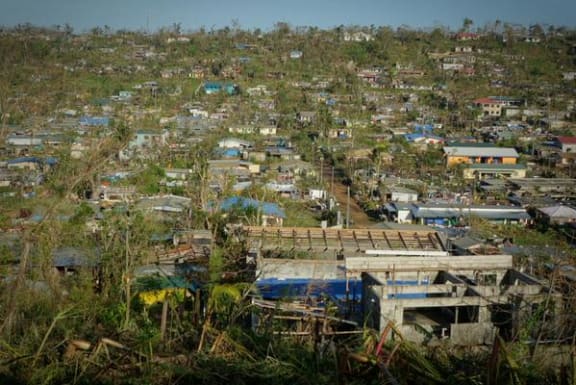

In Vila you can hear hammers banging as people try to rebuild lives. A bus driver asked if there was another cyclone coming. 17 March 2015.
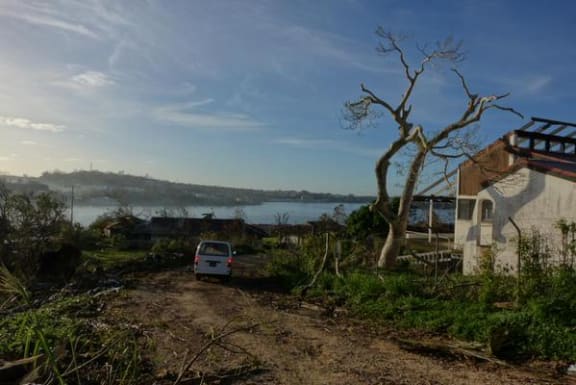

The National Disaster Management Office has confirmed the death toll as 11, five on Tanna Island, six in Vila. 17 March 2015.
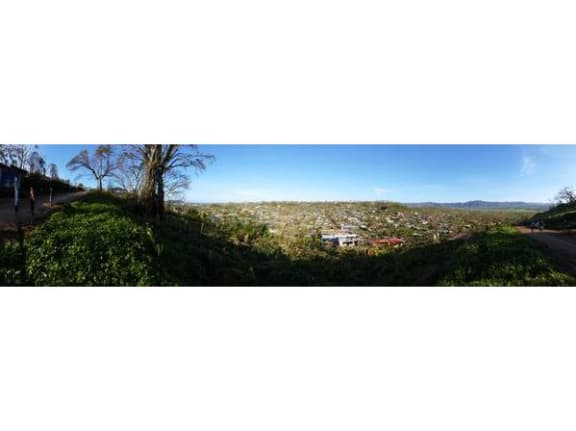

Heading out to Fresh Wota settlement, Vila's most populous. An evacuation centre has been set up at the school. Reporter Koroi Hawkins is both curious and apprehensive about what awaits him.
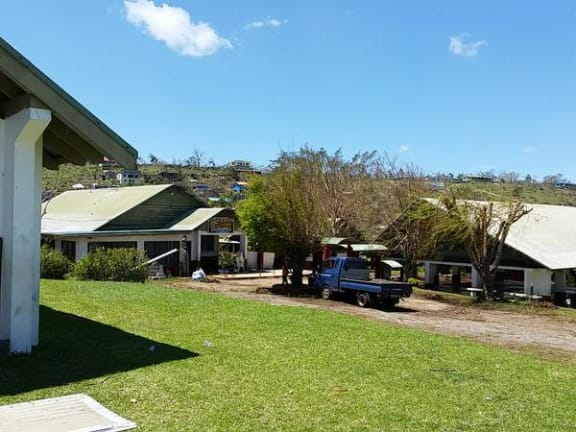

Fresh Wota School evacuation centre. Population 600 - equals 600 moving stories. 17 March 2015
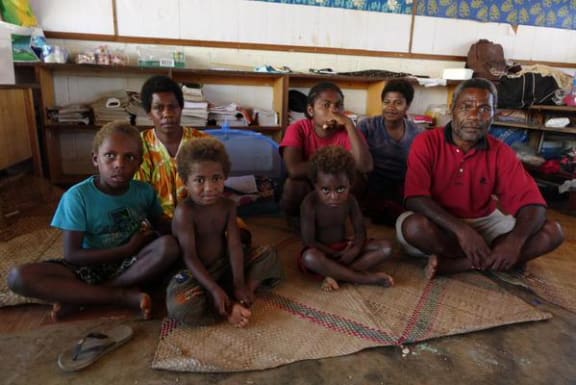

Fresh Wota residents Ralph & Mary Yalu and family. Their home was destroyed by cyclone Pam. Their local school is also gone. 17 March 2015.
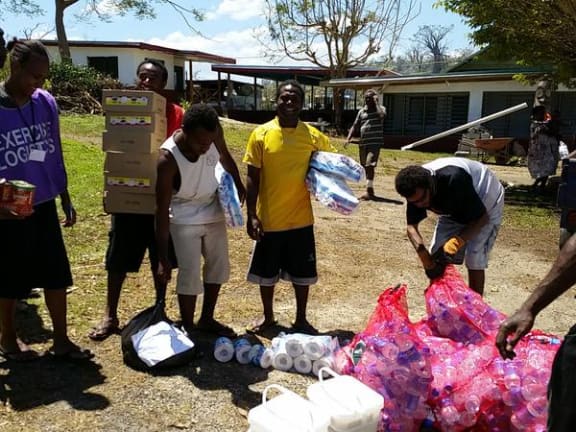

Relief supplies arrive at Fresh Wota from National Disaster Management Office. Drinking water and food are the major needs here. 17 March 2015.
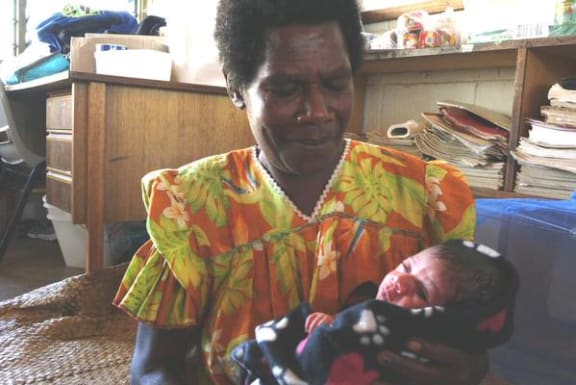

A ray of hope. Mary Yalu lost her home but gained a grandchild. Pamina is one of many babies born during cyclone Pam. 17 March 2015.
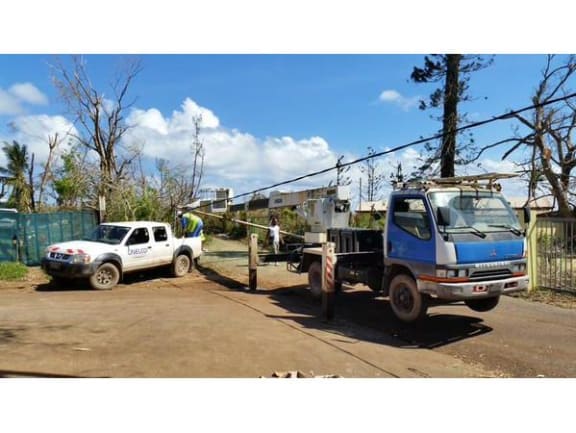

Electricity and water suppliers UNELCO are hard at work. This crew say electricity is restored to many areas, but say it will take months to restore the full grid. 17 March 2015.
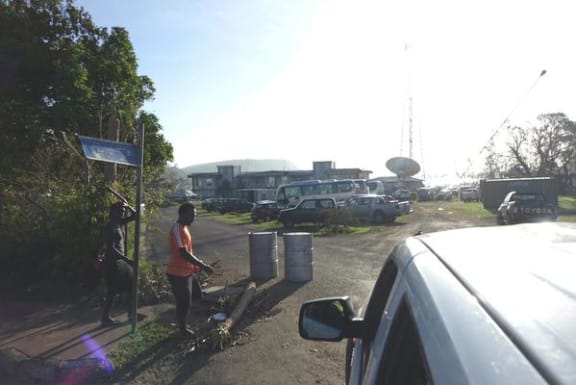

National Disaster Management Office truck returns to HQ after relief delivery to evacuation centres. The items include rice, canned food and toiletries. 17 March 2015.
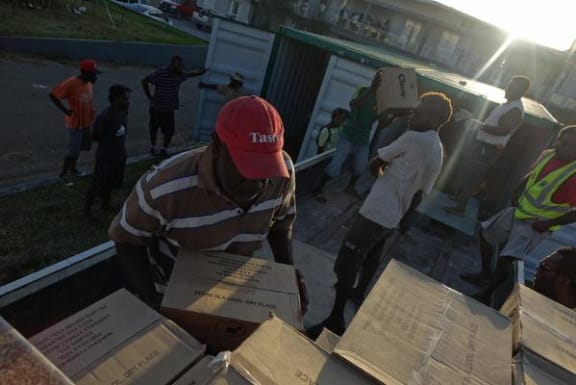

Vanuatu volunteers store donated goods. Most are victims yet work all day with a smile. It is remarkable and humbling. 17 March 2015.
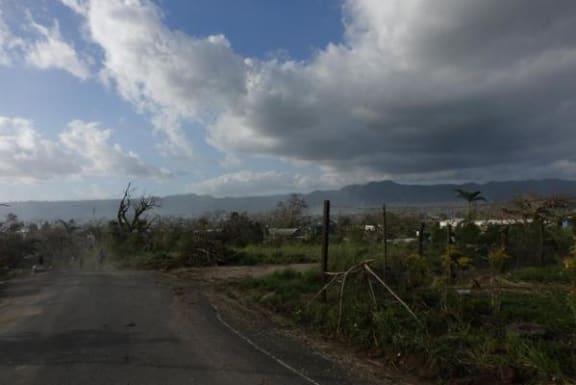

As far as the eye can see in every direction everything is torn, broken or simply no more. paradise lost...for now. 17 March 2015.
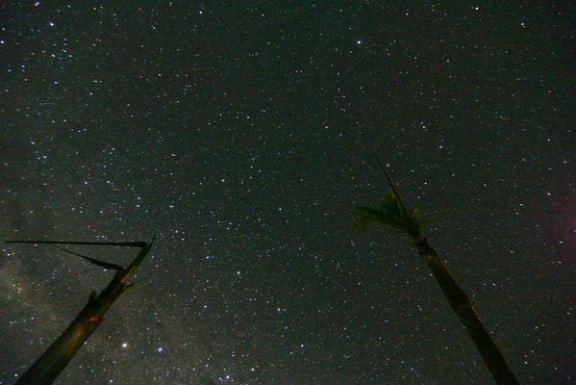

The perks of a blackout in Vila. No lights but all the stars are out. 17 March 2015.


Good morning from Vila. Heading to the hospital hoping to speak with the medical superintendent about the situation there. 18 March 2015.
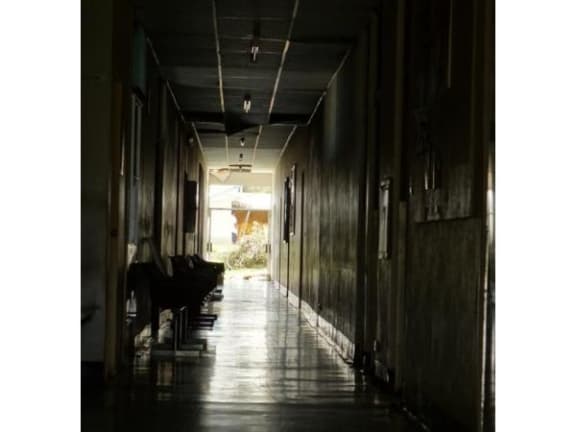

The medical superintendent at Port Vila hospital says a large influx of patients is straining resources but that a mobile hospital to be staffed by Australian and NZ doctors arrives today.
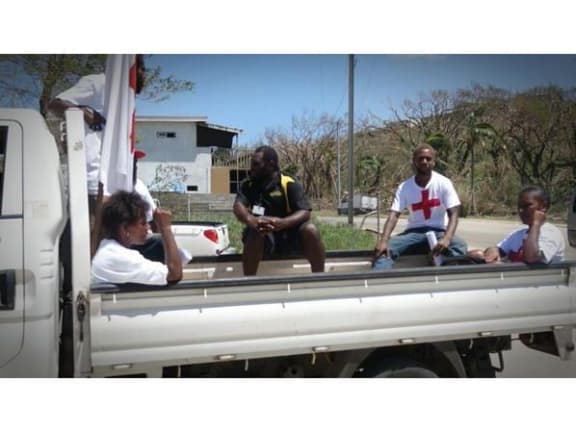

Red Cross Vanuatu says it will wait for National Disaster Management Office to give the OK before it starts distributing supplies. 18 March 2015.
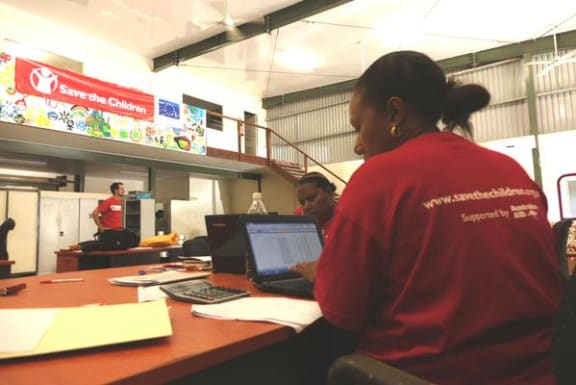

Save The Children says it is already distributing food and basic items to 2000 homeless in Vila, with the government's knowledge. 18 March 2015.


On my way to Mele village. I've heard root crops are inundated, a huge problem for many who rely on gardens for survival. - RNZI Reporter Koroi Hawkins.
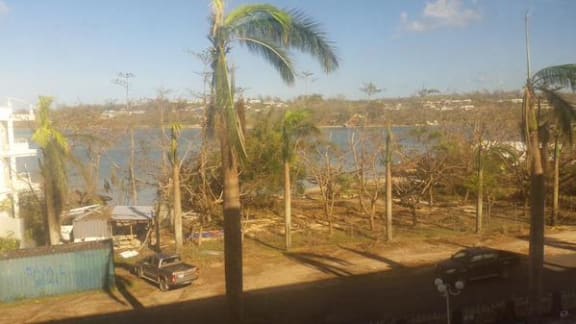

A story reporters hear often: "Now we have a water view... we didn't before." 18 March 2015.
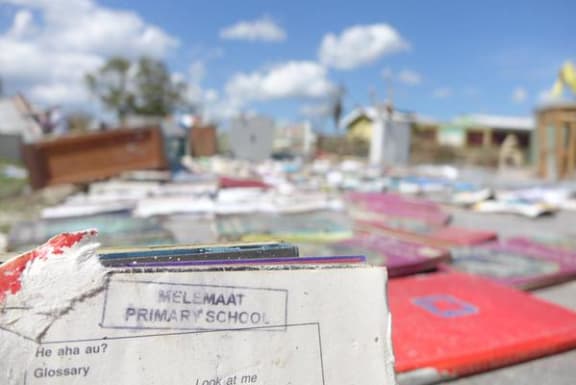

Books drying on a slab that used to be the Melemaat Primary School, with 400 students. Schools in Vanuatu will reopen in a few weeks.
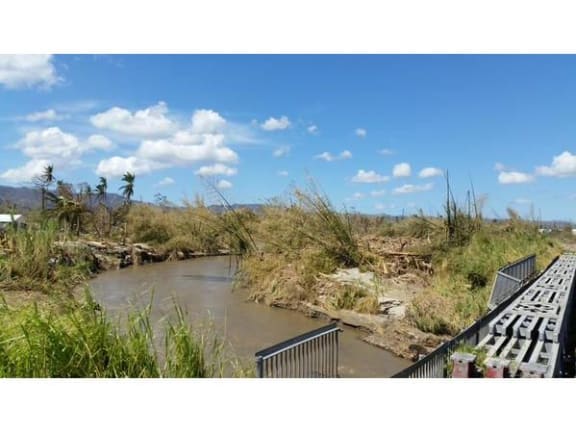

A creek at Prima still runs muddy. Houses and remnants of houses lie scattered across the muddy wasteland.
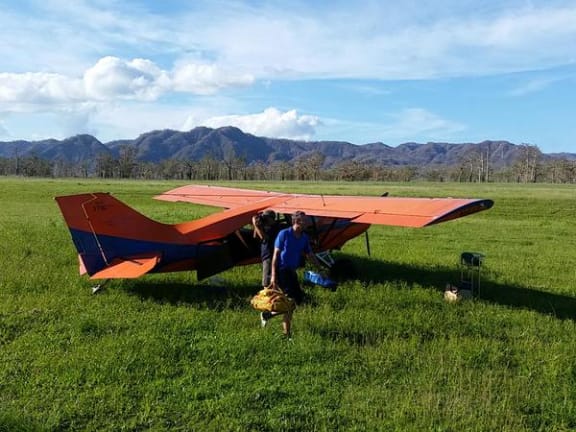

About to take off for a flyover of Efate. Plane door removed for better video shooting.


The Maule is a STOL (short takeoff and landing) aircraft based in Torba Province, run by Wings of Hope flying doctor service in Vanuatu. Reporter Kim Baker-Wilson has butterflies.


Vila looks beautiful, yet desolate from the air.


Emergency banking is available at Tyock Street, Vanuatu - at the ANZ manager's residence. The main branch is yet to reopen. 18 March 2015.


Measles vaccinations are ramping up in Vanuatu after the cyclone. 18 March 2015.
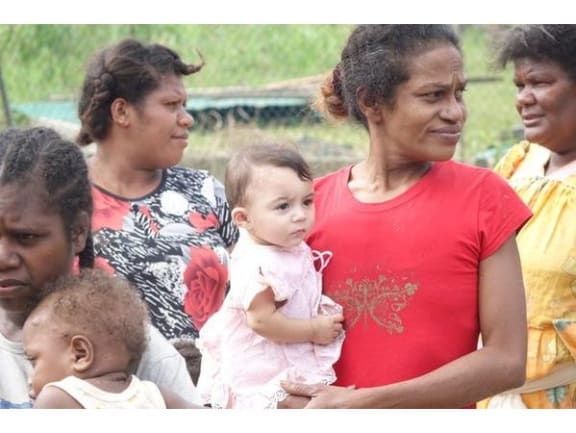

The race to immunise against measles in Vanuatu. 19 March 2015.


Waiting at today's vaccination drive. 19 March 2014.


The children's ward at Port Vila's hospital was a hard place to be. KBW 19 March 2015.


Vanuatu's Director General of Climate Change Jotham Napat says aid distribution starts tomorrow (20th March). Vanuatu State of Emergency declared 18 March.
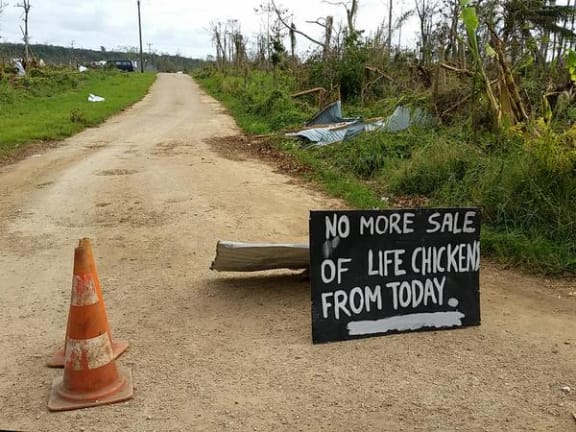

Chico farm in Teoma has been selling live chickens for 200 vatu - 300 less than before the cyclone. It was too popular. 19 March 2015.
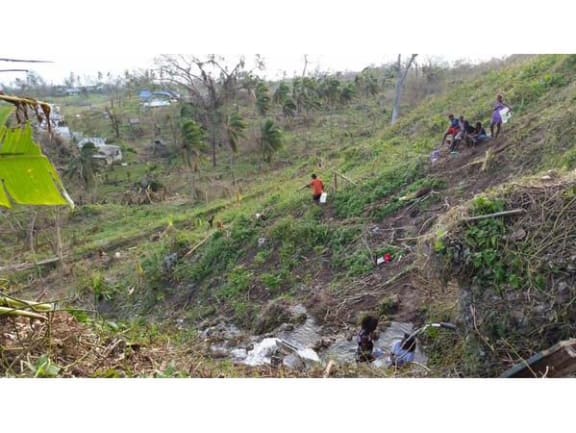

Women and children bathe in water gushing from the rocky hillside at Number 2 lagoon. Heavy rains made this torrent. 19 March 2015.
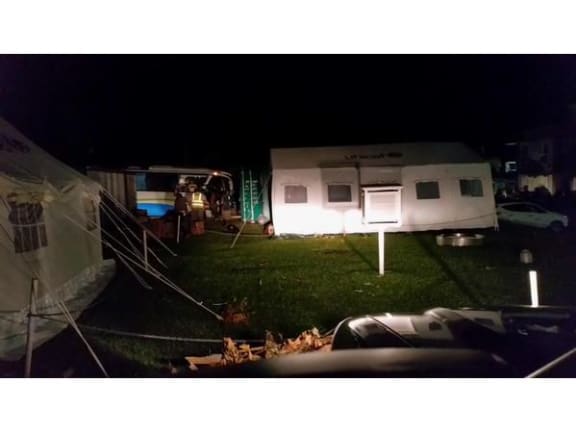

Relief deliveries have started for Vila. Buses filled with food and other items are on their way. Still no shelter kits but it's a start! 19 March 2015.
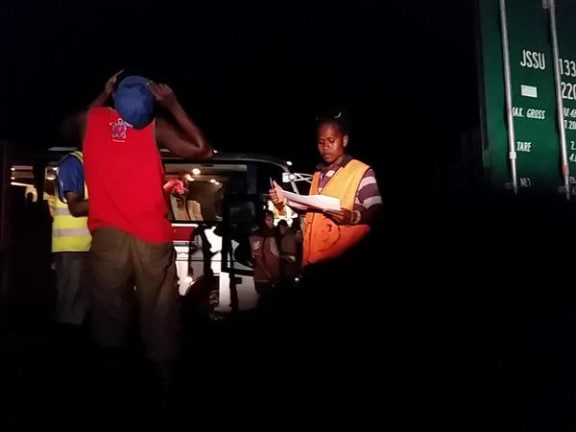

NDMO staff say a ferry laden with relief supplies left for Tanna Island tonight. They say more ferries will be loaded tomorrow. 19 March 2015.
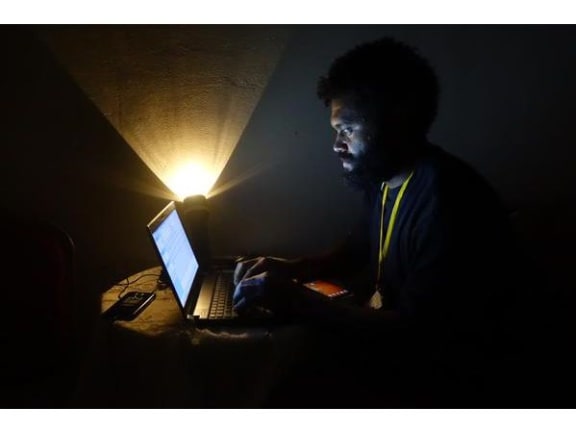

Still no power for us in Port Vila. Reporter Koroi Hawkins makes the most of the battery left in the laptop. 19 March 2015.
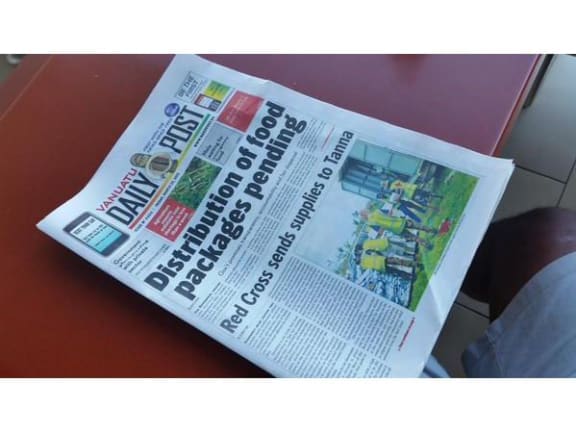

The newspaper is back in print as electricity to parts of Vila continues to be restored. The front page questions relief aid delays. 20 March 2015.
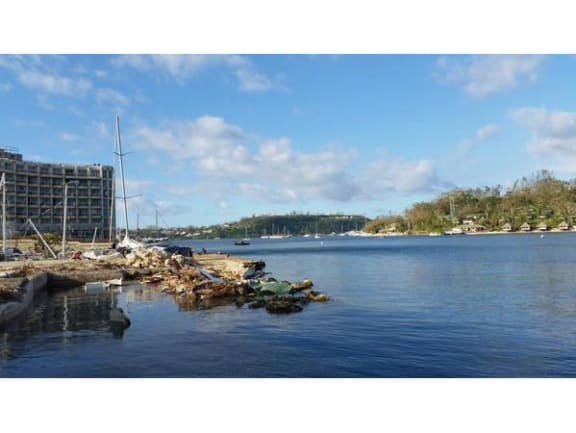

Govt tax exemptions on building materials are coming into effect. There is a private sector forum on economic recovery today. 20 March 2015.
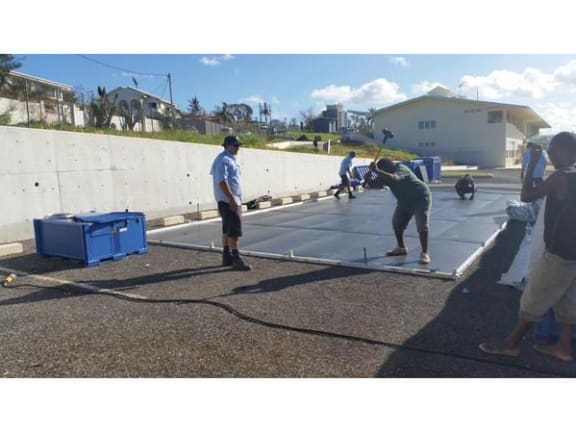

A mobile hospital is being erected at Vila hospital to help with influx of patients from cyclone Pam.


Unicef volunteers packing 700 school kits for Vanuatu kids affected by Pam. Many schools have been destroyed.
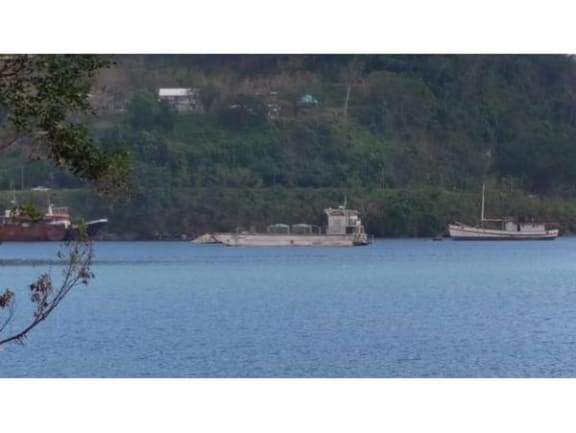

I am going out on the barge Epi Dream to the Shepherd Islands during the the next 3 days. The group was hit badly by Pam. - reporter Koroi Hawkins.
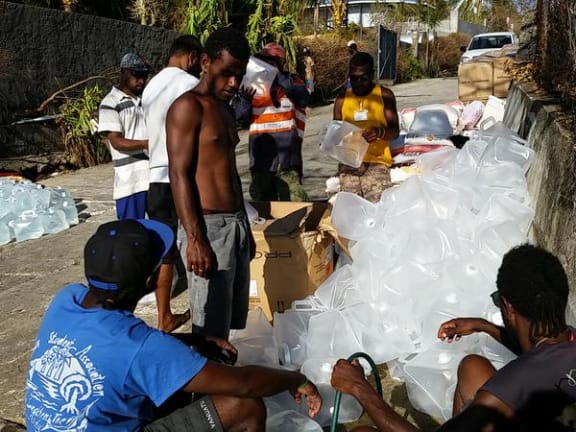

Helping to fill 2000 x 10 litre water containers to go to Shepherd Is. Only one hose pipe. Could be here a while!


Thank goodness for splitters!
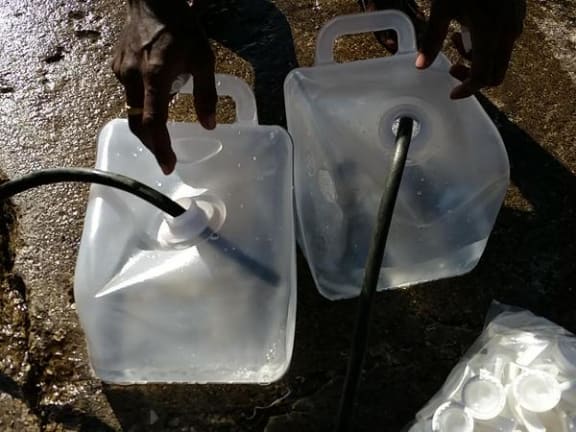

D.I.Y efficiency in action.
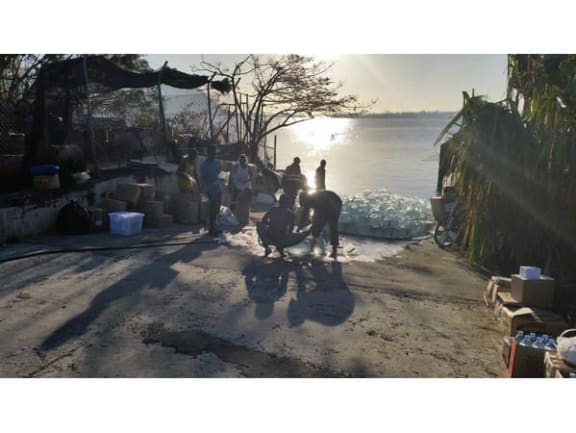

Progressing well, still a little over thousand to go I think. Six hoses now, and the one from the nearby depot is high pressure. 20 March 2015
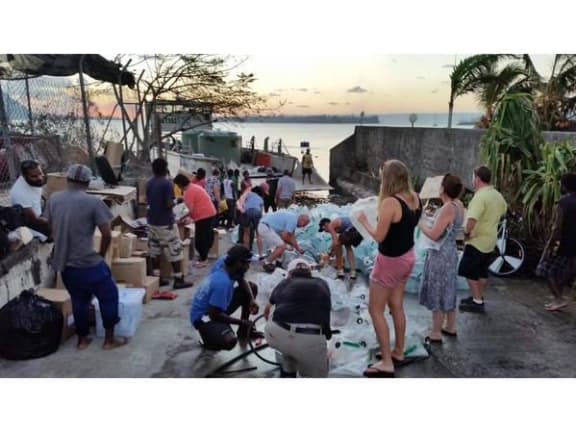

Barge has arrived. Now we load it!


Loading 50 x 25kg rice bags to go to Shepherd Islands
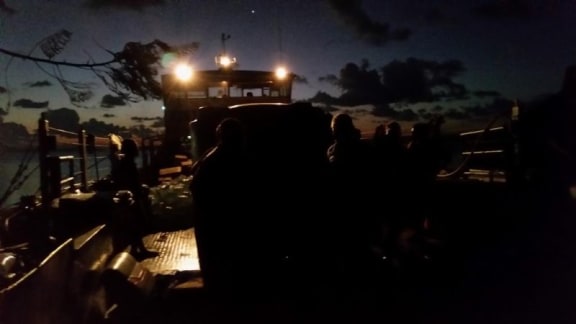

Chain gang loading water onto the Epi Dream barge bound for Shepherd Islands.
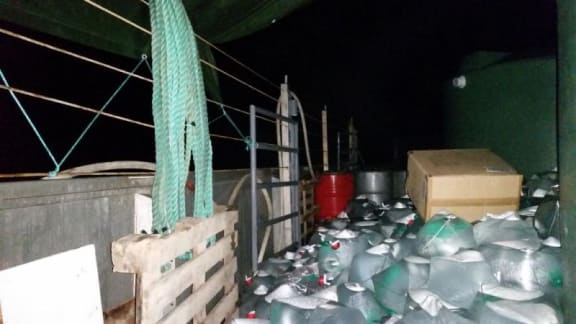

And we're off. Have tonnes of water, food and medical supplies, and personnel. Hope it's enough. The sea is rougher than expected. First stop Matapoa ETA 2:00 am VUT.
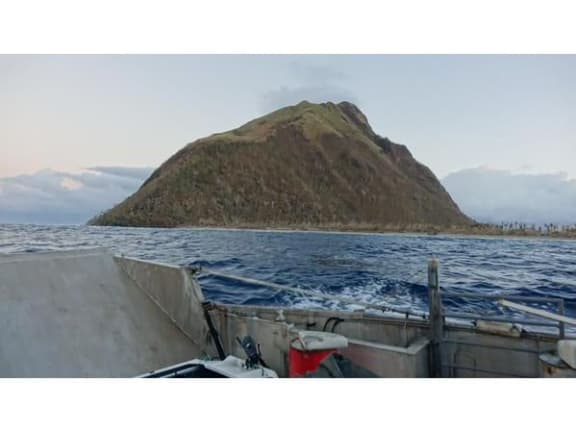

Dawn on Saturday 21 March. Arriving at Mataso Island.
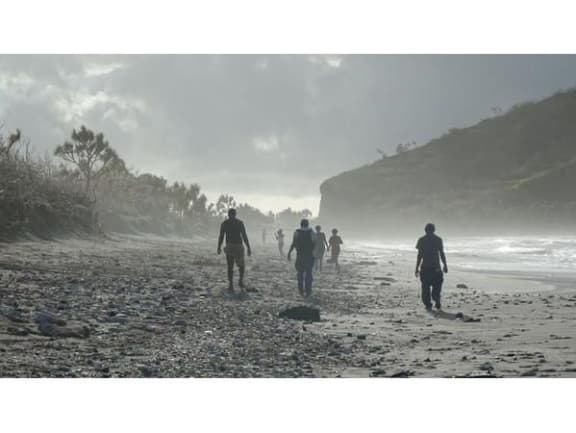

There is no landing so we run up the Mataso island beach. I'm with a doctor, a nurse and a guide. Don't know what to expect.
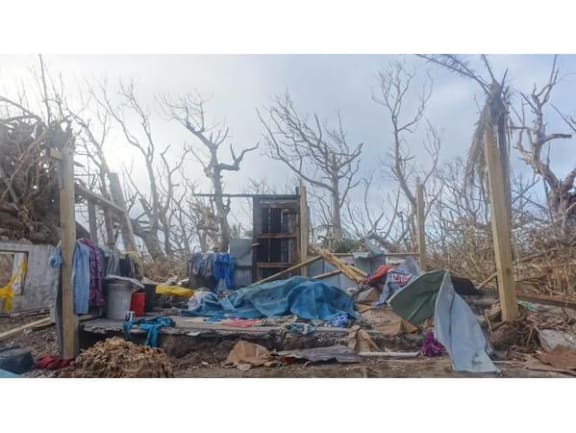

No shelter kits have reached Mataso in the 7 days since Cyclone Pam.
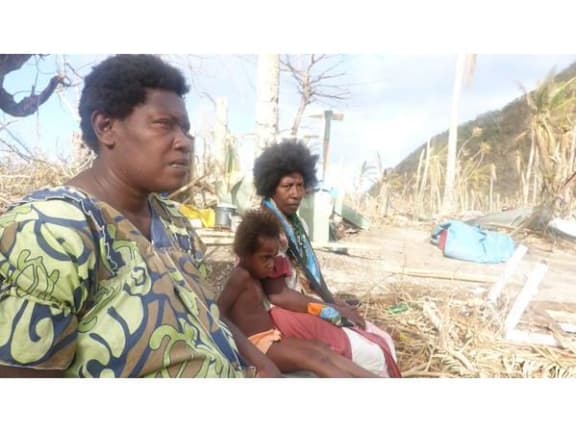

Rachel, Naomi and little Joycelyn rest in a bit of shade.
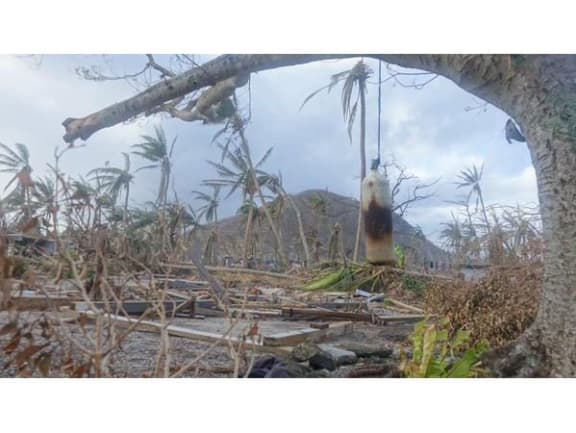

A makeshift prayer bell swings over the wreckage of Mataso Island's church. Everyone I meet here says God Bless You.
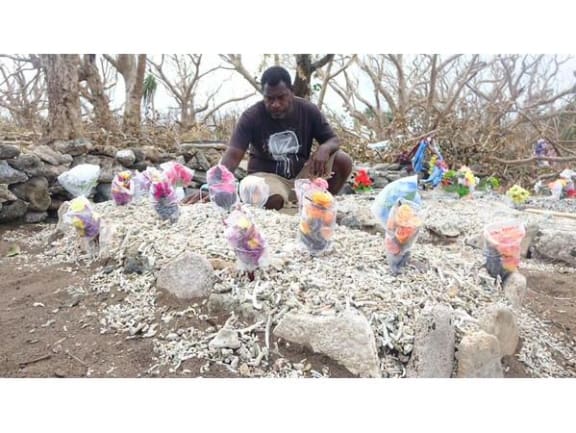

A woman died of head injuries 6 days after Cyclone Pam. There were no medics here. Grandchildren placed their gifts to her on the grave. 23 March 2015.
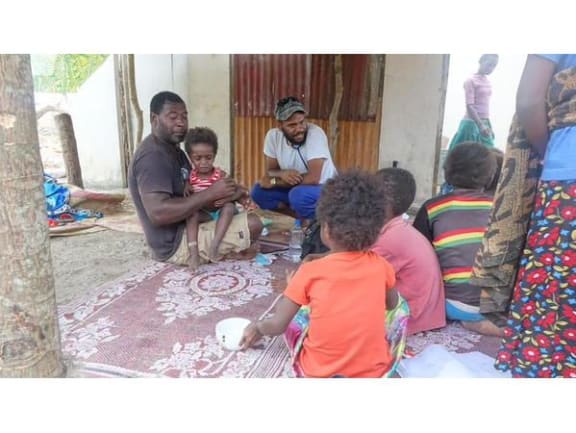

Saturday. No medicines in Mataso. Dr Jim said dehydration, respiratory illness and infected cuts are the main concerns. 23 March 2015.
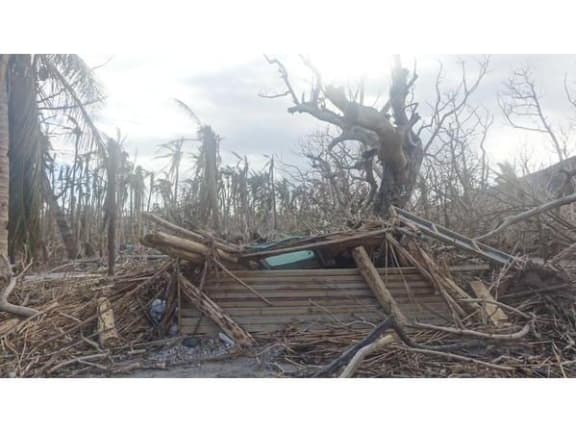

The force of nature. A wide shot of a destroyed house on Mataso island.
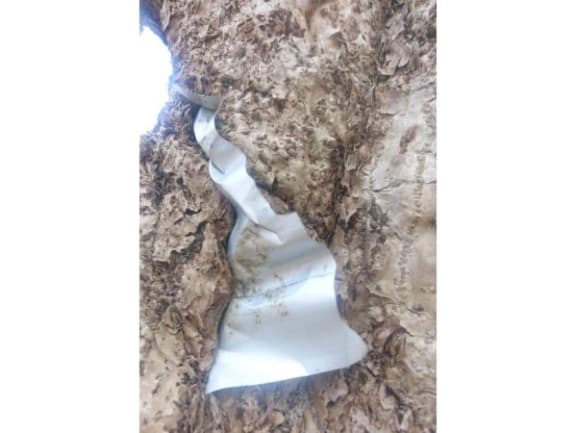

Something shiny buried in a tree trunk. Probably roofing iron.
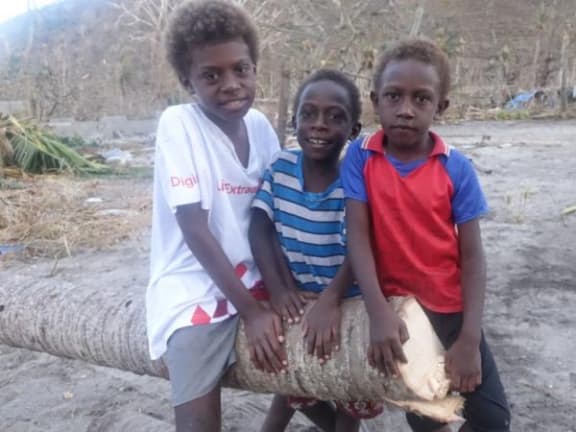

These lads on Mataso made the most of the destruction around them, turning this coconut into a seesaw trampoline. 23 March 2015.
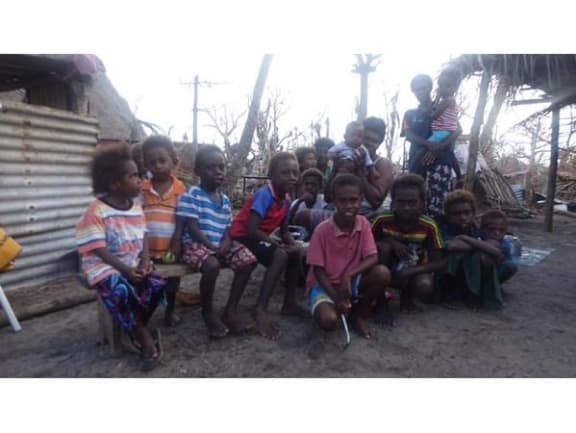

Mataso kids have lost their school.


Some Mataso kids were sick and getting cuts from debris. Dr Jimmy warned them to be careful.


This baby on Mataso was not shy and kept trying to grab the camera. There was no medicines or shelter at the time.
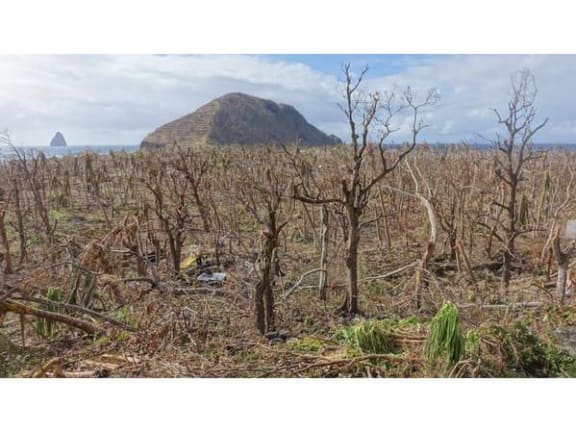

Mataso people have had no water, shelter or medicine for 6 days. The supplies we left are only enough for a few days.
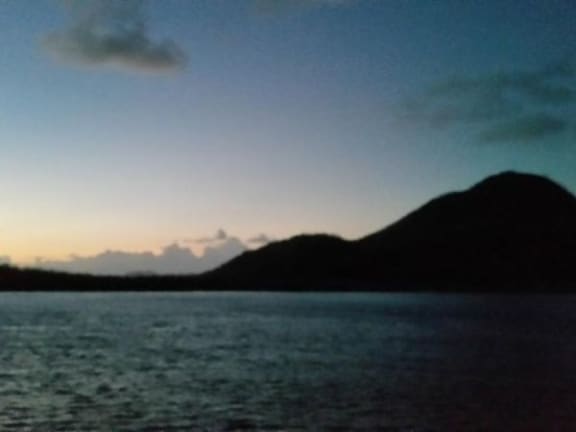

Heading to Epi in the Shepherds group now. 23 March 2015.
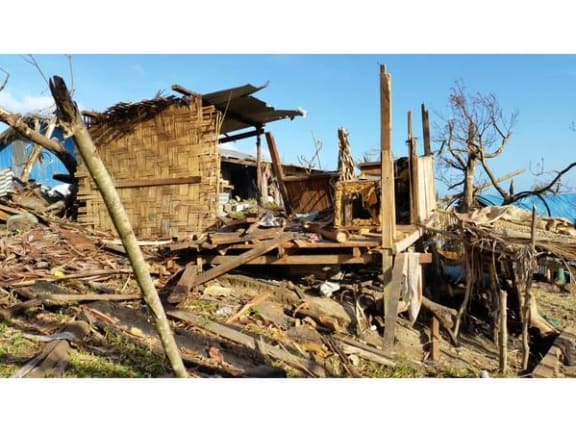

South Epi was hit hard by Cyclone Pam.
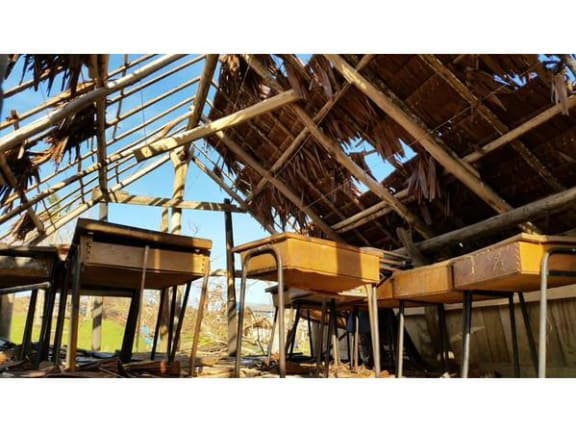

No learning here at the moment.
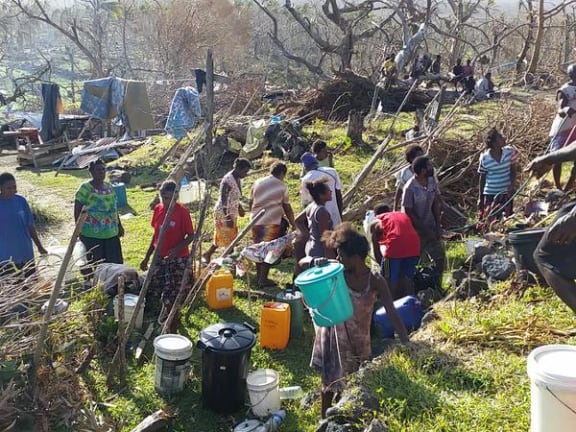

Finally I can talk about good news! Helicopter drops water container on South Epi. 24 March 2015
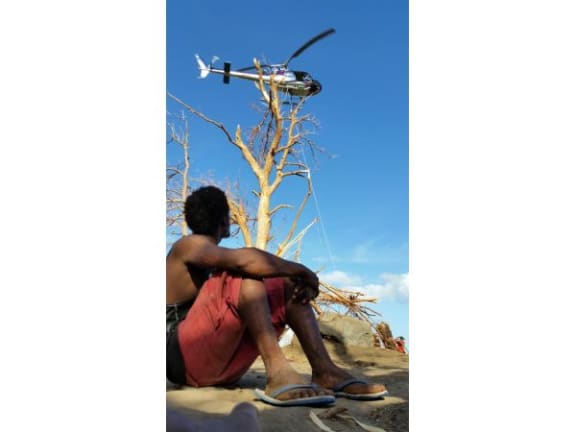

So some help is getting through, and PM says a boat is leaving Vila this morning for these areas.
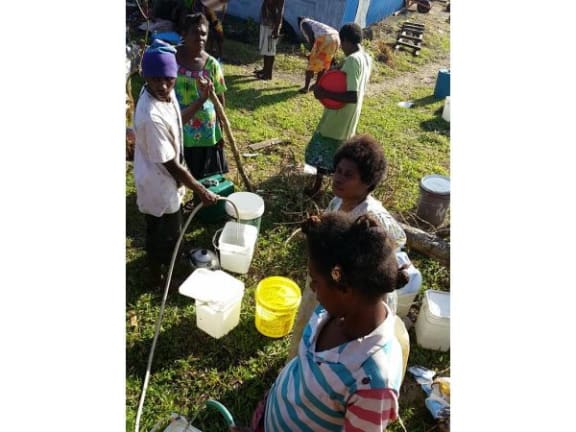

Helicopter drop includes water and rebuilding supplies. 24 March 2015.
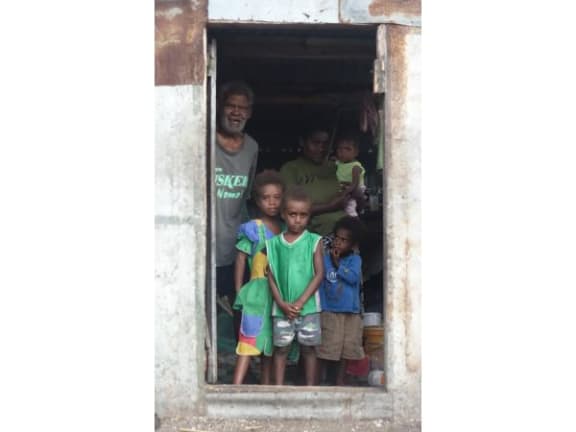

Sakaio and Tessa Cook and family. 23 March 2015
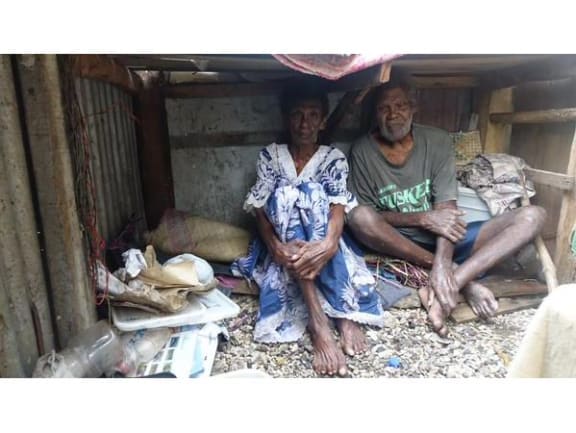

Sakaio and Tessa Cook show me where they hid from Cyclone Pam after telling their children to save their grandchildren.
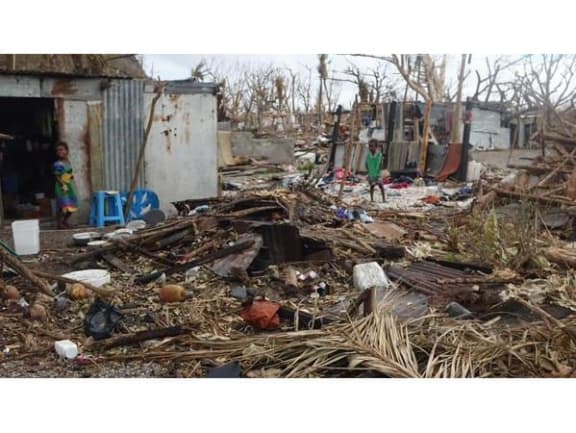

Sakaio and Tessa Cook and family at home. 23 March 2015
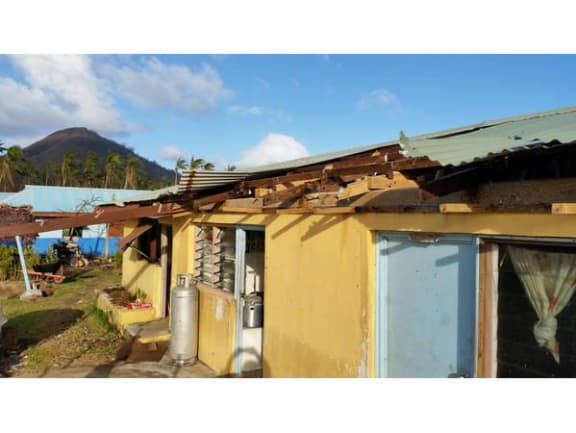

The clinic at Emae was damaged by Cyclone Pam. 24 March 2015.


1200 Emae people are affected and now have poor access to medicine.


At Lemanu Island, North of Epi. Its better off than other areas but they said this was the first relief to reach them.


Nurse Leiwia stands where she delivered Lemanu's cyclone baby Patrick Pam. She says medical supplies are low. 23 March 2015.
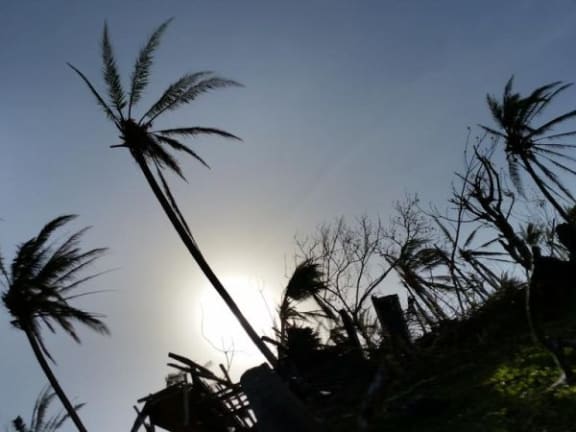

Hope to be back on Mataso tody for first time since Saturday. Praying everyone is okay and hoping relief has got through. 24 March 2015.


Last day in the Shepherds has been very heartwarming was able to return to Mataso and see some meaningful assistance. 24 March 2015.
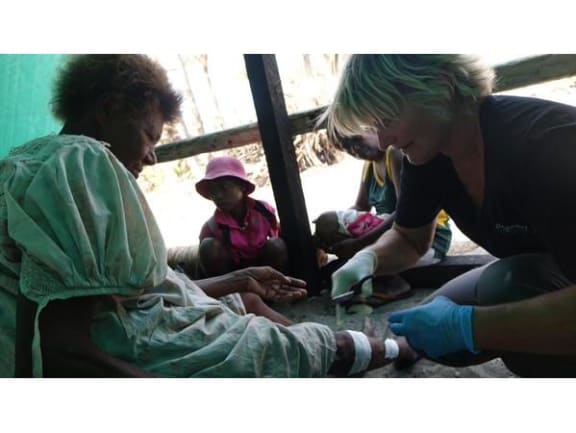

I've helped clear tree-blocked paths and translated for a medical and water purification team. So happy to help a little. 24 March 2015.
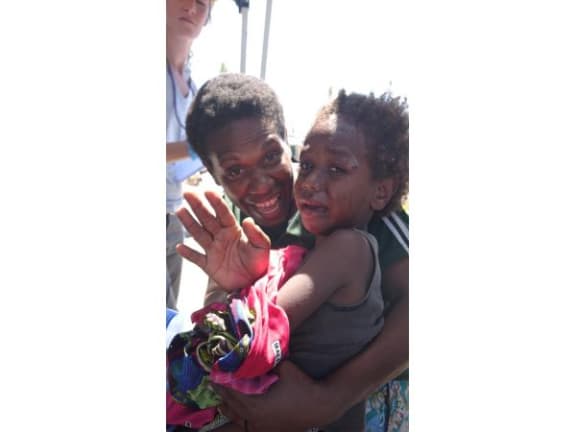

Mixed emotions at the medical tent. 24 March 2015.
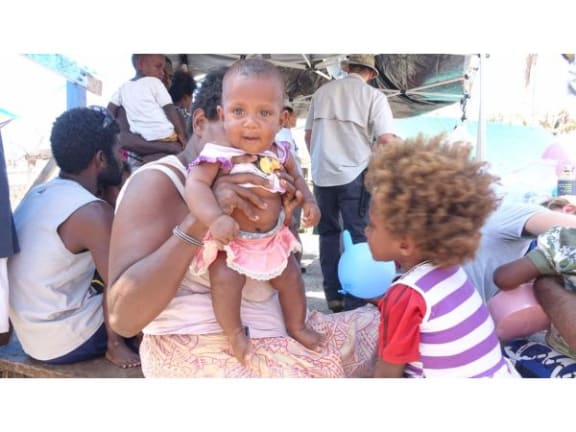

Met baby Joel again he got a clean bill of health. Good to see relief getting to Mataso. Hope recovery starts soon. KH 24 March 2015.
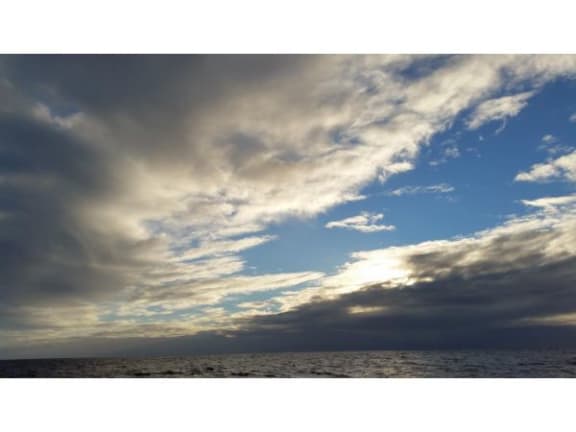

Steaming towards Eramango 25 March 2015.
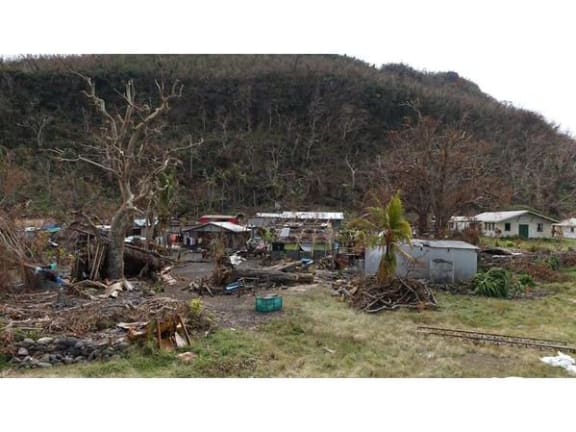

Eramango was directly hit by Pam. 25 March 2015.
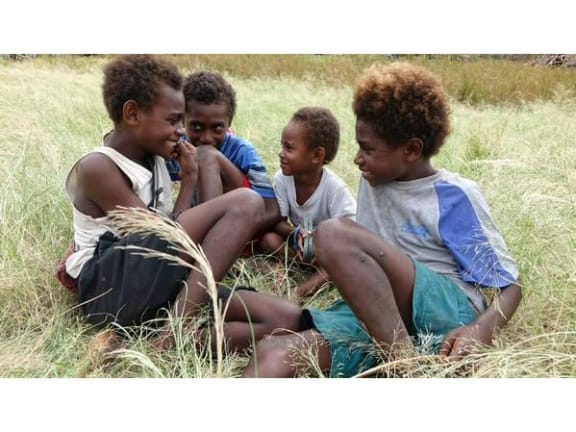

It's two weeks tomorrow since Cyclone Pam. 25 March 2015.
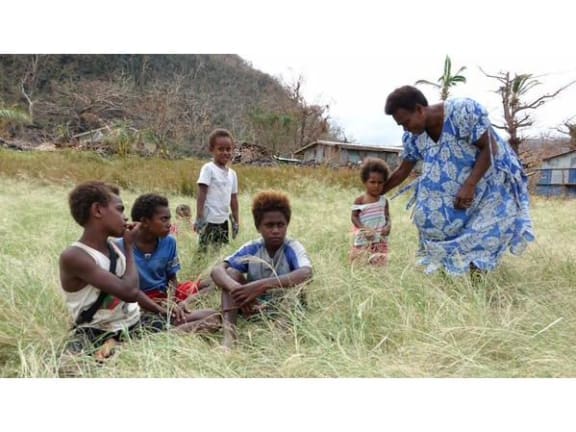

Got there this morning no food or shelter relief has reached them. 25 March 2015.


Child on Eramango 25 March 2015
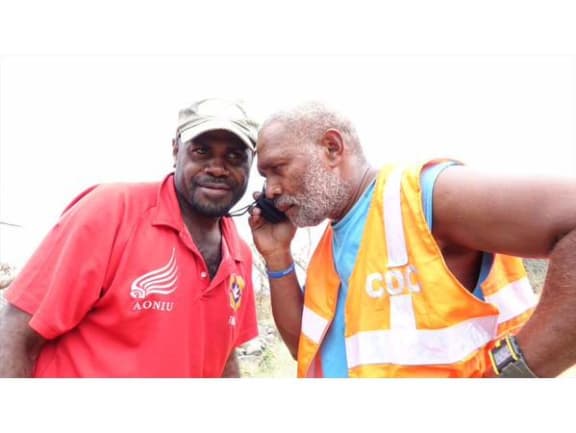

Eramango chief Jason Mete interviewed on satellite phone. The first phone call since Cyclone Pam. 26 March 2015.
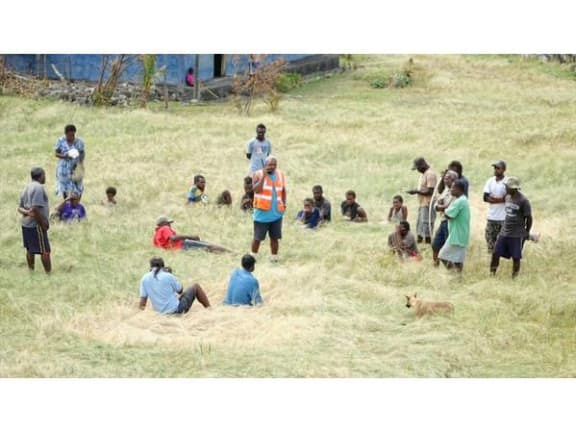

People came out to watch. 26 March 2015.
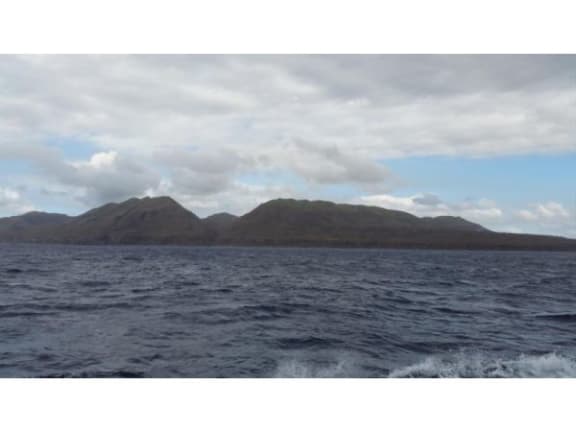

Tanna Island. Everywhere so far food is down to a few days supply. So many villages so few resources very little time. 26 March 2015
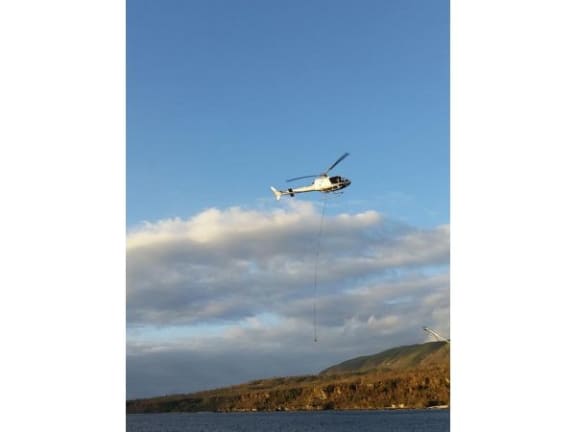

Water airlifted to villages on Tanna. 26 March 2015
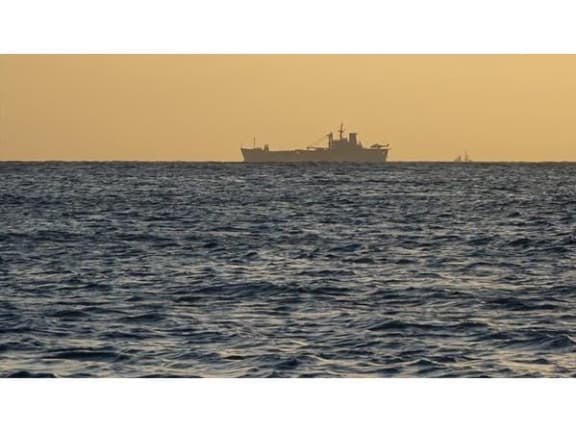

Warship off of Tanna. Has Blackhawk helicopters on it. 26 March 2015
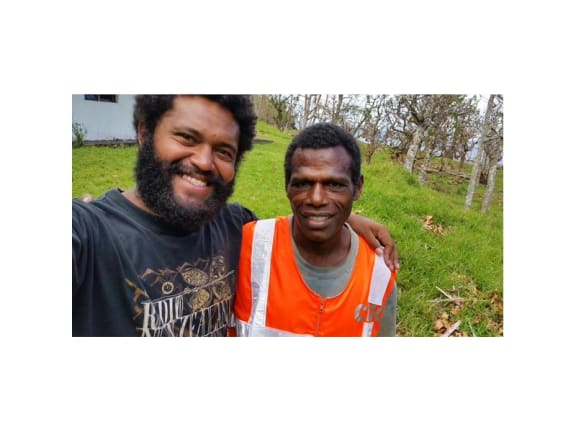

"Flying out of Vanuatu I leave my heart behind with the beautiful people in all the villages I have been to" Koroi Hawkins. 29 March 2015.
Vanuatu after Cyclone Pam
US warns citizens not to attend Akl TPP rally
The controversial Trans-Pacific Partnership (TPP) seemed to divide public opinion, spark intense opposition - and intrigue RNZ readers. Our story on the United States Consulate warning US citizens about "the risk" of attending a large anti-TPP deal rally in Auckland was our sixth most-read piece online.
Coming in at number 10 was another TPP story, this time on Prime Minister John Key admitting the cost of medicine would rise under the trade agreement.
Another TPP-related story, this time on Wikileaks documents showing New Zealand government was pushing for deregulation in trade negotiations, was our 13th most-read story.

Photo: RNZ
Payouts for underpaid beneficiaries
A mistake by Work and Income that resulted in benefits being paid a day late for almost 20 years hit the news in November, and was RNZ's seventh most-read news item online. Beneficiaries started claiming back the extra day's pay, while Parliament scrambled to enact legislation cutting off the payments.
NZ student mistaken for terrorist
A Sikh student having a coffee at an Auckland cafe with his professor was mistaken for a terrorist in November, with one person taking it upon themselves to call 111 to alert police. Police approached Jaspreet Singh to investigate whether he was carrying a bomb. It turned out it was just his headphones.
A cafe worker who overheard a woman calling the police said it was no more than racism.
"They had no reason to call. She just said 'oh, he has a turban'... So soon after the [Paris] terrorist attacks and everything, people are being crazy."
The story comes in at number eight on our list. In wake of the incident, Indian Sikh MP Kanwaljit Singh Bakshi called for caution before people jumped to conclusions and raised false alarms.
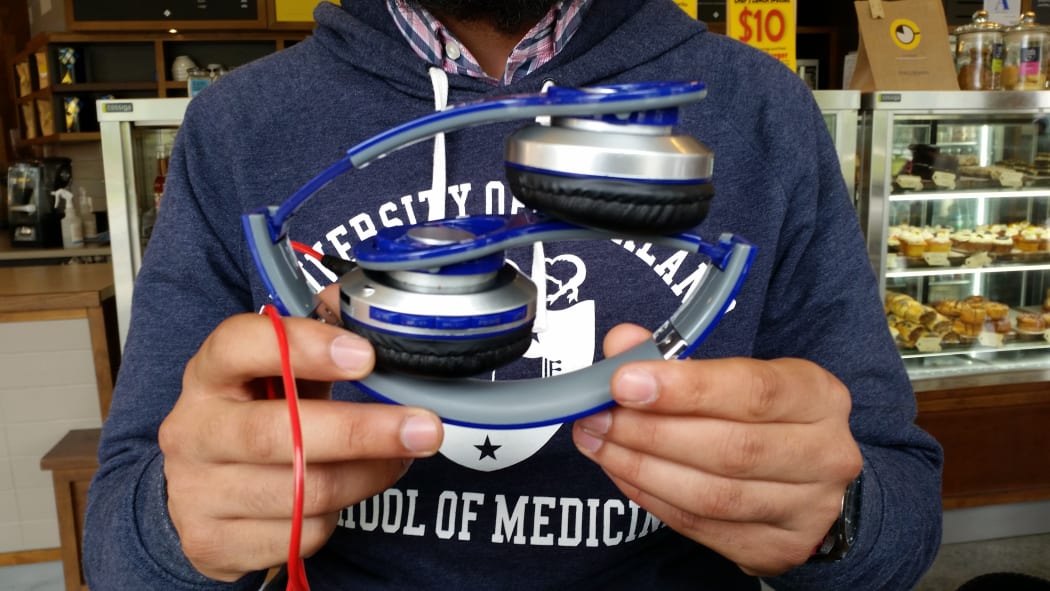
Jaspreet Singh's headphone wires were mistaken for bomb wires.
Photo: RNZ/Mohamed Hassan
Weather disruption - what you need to know
This fast-moving weather story kept readers informed about evacuations on the Kapiti Coast, surface flooding, mud slips and torrential rain. In our ninth most-read story, it was all happening in the Wellington region.
Other stories in the most-read 25
We've already mentioned our 10th most-read story and our 11th, but want to take a moment to include our 12th most-read news item online - that of John Campbell coming home to RNZ.
Checkpoint with John Campbell is starting to take shape. It will start on 18 January and will be broadcast on radio and video-streamed live on the RNZ site.
Campbell has already created some stellar stories for RNZ since he joined the team, including an investigation into how Apple New Zealand had revenue of $568 million and paid tax of only $6.8 million. He also travelled to Christmas Island - home of one of Australia's detention centres - to unlock some its secrets.
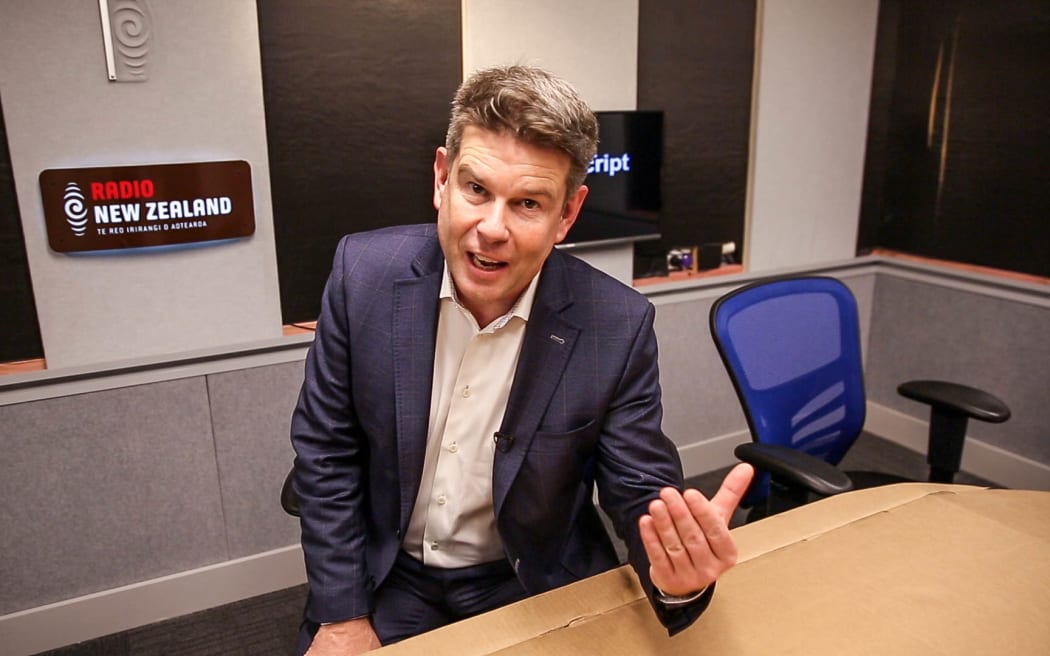
Photo: RNZ / Cole Eastham-Farrelly
Christmas Island, as well as other detention centres across the Tasman and, more prominently, Australia's tough new rules on immigration - which have resulted in hundreds of New Zealanders detained, and several deported - is undoubtedly one of the stories of the year.
A piece on two young children with New Zealand mothers who were detained and facing deportation because they weren't New Zealand citizens and a story about a Kiwi man in detention while his partner died alone were also among the 25 most-read stories.
Earlier this month, former New Zealand journalist Maihi Nikora spoke from his hospital bed about his four missing grandchildren. They had been missing for six weeks after their father picked them up from day care and school. The story touched many of our readers, who would have been relieved when they were returned safely to their mother a week later.
Other stories making up the top 25 included:
As our top 25 most-read stories reveal, it has been an interesting year for New Zealand news. No one knows what is around the corner - what intriguing, fascinating and surprising things will happen next. Another year passes us by and another starts. Who knows what it will bring?

























































































































































































































